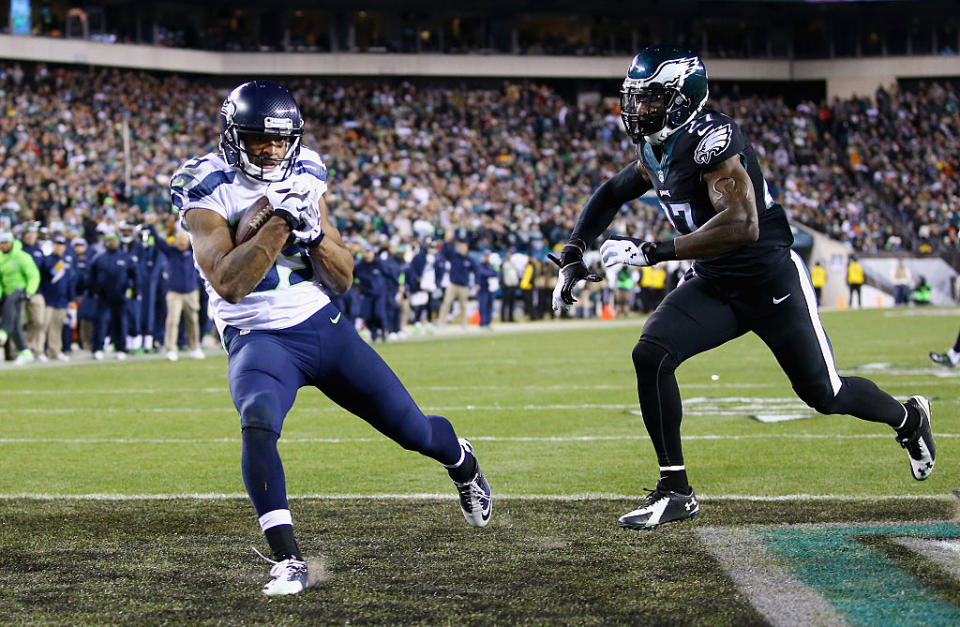NFL players respond to Trump's pardon offer

The ongoing NFL controversy regarding protests during the national anthem is, at its heart, a request to be heard. The players who knelt during the national anthem last year weren’t doing so to disrespect the flag, but to bring attention to causes of systemic racism and social injustice. And while President Trump inflamed passions against the protesters last fall — and many times since — by trying to paint the silent, nonviolent protests as unpatriotic, he struck a different tone recently, offering to listen to the players’ grievances.
And now, in a New York Times editorial, four players — Doug Baldwin, Malcolm Jenkins, Anquan Boldin, and Benjamin Watson — have taken the president up on his offer.
What was Trump’s offer to NFL players?
Earlier this month, shortly after pardoning Alice Johnson, 63, who was serving a life sentence for a nonviolent drug offense, Trump made an offer that, based on his prior rhetoric, was nothing short of remarkable:
“I’m going to ask all of those people to recommend to me — because that’s what they’re protesting — people that they think were unfairly treated by the justice system,” Trump said. “And I understand that. I’m going to ask them to recommend to me people that were unfairly treated and I’m gonna take a look at those applications and if I find and my committee finds that they’ve been unfairly treated than we’ll pardon them. Or at least let them out.”
There are a number of “if” conditionals in that statement, and plenty of room to move around rhetorically, but — without speculating on whether the offer was in good faith, or indeed if anything will happen at all — the fact that the offer was made at all is a step forward. And now, the players have responded.
What are the players seeking from the president?
Understanding. So much of the whirlwind about the protests revolved around the idea that they were somehow “unpatriotic,” and Trump himself was the largest force behind that whirlwind. But the players took pains to break down exactly what they are seeking.
Without explicitly saying so, the players noted the real reason behind the protests: to question a system they see as stacked unfairly against them. “As Americans, it is our constitutional right to question injustices when they occur, and we see them daily: police brutality, unnecessary incarceration, excessive criminal sentencing, residential segregation and educational inequality.”
The players further noted that their status as “millionaire athletes” (protest opponents often add “spoiled” to that description) has nothing to do with what they’re seeking: “Our being professional athletes has nothing to do with our commitment to fighting injustice. We are citizens who embrace the values of empathy, integrity and justice, and we will fight for what we believe is right. We weren’t elected to do this. We do it because we love this country, our communities and the people in them. This is our America, our right.”
How could pardons help?
“President Trump could help,” the players wrote. “He could use his powers, including the clemency power, to make a real dent in the federal prison population.”
Pardons, the players noted, could commute the sentences of nonviolent offenders and elderly, low-risk prisoners. Elderly prisoners will make up 28 percent of the federal prison population by next year, but the Bureau of Prisons approved only 6 percent of about 5,400 “compassionate release” applications.
Plus, the players note, a significant percentage of prisoners are drug offenders rather than violent criminals. “Of the roughly 185,000 people locked up in federal prisons, about 79,000 are there for drug offenses of some kind,” they wrote, “and 13.5 percent of them have sentences of 20 years or more.”
However, the players point out that a couple quick pardons won’t alter the systemwide inequality that led to this point. “[A] handful of pardons will not address the sort of systemic injustice that N.F.L. players have been protesting,” they wrote. “These are problems that our government has created, many of which occur at the local level. If President Trump thinks he can end these injustices if we deliver him a few names, he hasn’t been listening to us.”
What happens now?
That’s up to the president. Certainly, the ball is back in his hands. And if he wants to demonstrate that this was a genuine, good-faith offer, and not merely a tossed-off line forgotten shortly afterward, he’ll take a look at the names the players recommend.
The other alternative, of course, is that the president will be swayed by the opinions of much his populist base and not meet the players halfway, since a significant portion of the president’s base does not support protesting during the anthem for any reason. If the president listens to that segment of his base, it won’t matter how many fact- or emotion-based arguments the players make.
Regardless, we now have, for the moment, two steps forward in this debate, which is two more than we had for most of last season.
____
Jay Busbee is a writer for Yahoo Sports. Contact him at jay.busbee@yahoo.com or find him on Twitter or on Facebook.
More from Yahoo Sports:
• Rockets fans pile on negative Yelp reviews for Ayesha Curry’s new Houston restaurant
• Dan Wetzel: Why don’t top NBA draft prospects want to go to Memphis?
• Brett Favre says Aaron Rodgers understands why Favre was distant
• Former WWE star Vader dies at 63
